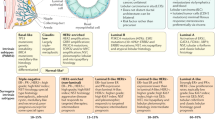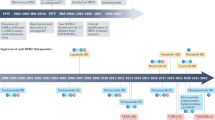Abstract
Background
The optimal time to deliver adjuvant chemotherapy has not been defined.
Methods
A retrospective study of consecutive patients receiving adjuvant anthracycline and/or taxane 1993–2010. Primary endpoint included 5-year disease-free survival (DFS) in patients commencing chemotherapy <31 versus ≥31 days after surgery. Secondary endpoints included 5-year overall survival (OS) and sub-group analysis by receptor status.
Results
We identified 2003 eligible patients: 1102 commenced chemotherapy <31 days and 901 ≥31 days after surgery. After a median follow-up of 115 months, there was no difference in 5-year DFS rate with chemotherapy <31 compared to ≥31 days after surgery in the overall population (81 versus 82% hazard ratio (HR) 1.15, 95% confidence interval (95% CI) 0.92–1.43, p = 0.230). The 5-year OS rate was similar in patients who received chemotherapy <31 or ≥31 days after surgery (90 versus 91%, (HR 1.21, 95% CI 0.89–1.64, p = 0.228). For 250 patients with triple-negative breast cancer OS was significantly worse in patients who received chemotherapy ≥31 versus <31 days (HR = 2.18, 95% CI 1.11–4.30, p = 0.02).
Discussion
Although adjuvant chemotherapy ≥31 days after surgery did not affect DFS or OS in the whole study population, in TN patients, chemotherapy ≥31 days after surgery significantly reduced 5-year OS; therefore, delays beyond 30 days in this sub-group should be avoided.
This is a preview of subscription content, access via your institution
Access options
Subscribe to this journal
Receive 24 print issues and online access
$259.00 per year
only $10.79 per issue
Buy this article
- Purchase on Springer Link
- Instant access to full article PDF
Prices may be subject to local taxes which are calculated during checkout




Similar content being viewed by others
References
Colleoni, M., Bonetti, M., Coates, A. S., Castiglione-Gertsch, M., Gelber, R. D. et al. Early start of adjuvant chemotherapy may improve treatment outcome for premenopausal breast cancer patients with tumors not expressing estrogen receptors. The International Breast Cancer Study Group. J. Clin. Oncol. 18, 584–590 (2000).
Shannon, C., Ashley, S. & Smith, I. E. Does timing of adjuvant chemotherapy for early breast cancer influence survival? J. Clin. Oncol. 21, 3792–3797 (2003).
Lohrisch, C., Paltiel, C., Gelmon, K., Speers, K., Taylor, S., Barnett, J. et al. Impact on survival of time from definitive surgery to initiation of adjuvant chemotherapy for early-stage breast cancer. J. Clin. Oncol. 24, 4888–4894 (2006).
Gagliato, D., de, M., Gonzalez-Angulo, A. M., Lei, X., Theriault, R. L., Giordano, S. H., Valero, V. et al. Clinical impact of delaying initiation of adjuvant chemotherapy in patients with breast cancer. J. Clin. Oncol. 32, 735–744 (2014).
Chavez-MacGregor, M., Clarke, C. A., Lichtensztajn, D. Y. & Giordano, S. H. Delayed Initiation of adjuvant chemotherapy among patients with breast cancer. JAMA Oncol. 2, 322–329 (2016).
Raphael, M. J., Biagi, J. J., Kong, W., Mates, M., Booth, C. M. & Mackillop, W. J. The relationship between time to initiation of adjuvant chemotherapy and survival in breast cancer: a systematic review and meta-analysis. Breast Cancer Res. Treat. 160, 17–28 (2016).
Chang, H. Y., Sneddon, J. B., Alizadeh, A. A., Sood, R., West, R. B., Montgomery, K. et al. Gene expression signature of fibroblast serum response predicts human cancer progression: similarities between tumors and wounds. PLoS Biol. 2, E7 (2004).
Retsky, M., Bonadonna, G., Demicheli, R., Folkman, J., Hrushesky, W. & Valagussa, P. Hypothesis: Induced angiogenesis after surgery in premenopausal node-positive breast cancer patients is a major underlying reason why adjuvant chemotherapy works particularly well for those patients. Breast Cancer Res. 6, R372–R374 (2004).
Early Breast Cancer Trialists’ Collaborative Group (EBCTCG). Effects of chemotherapy and hormonal therapy for early breast cancer on recurrence and 15-year survival: an overview of the randomised trials. Lancet 365, 1687–1717 (2005).
Sparano, J. A., Gray, R. J., Ravdin, P. M., Makower, D. F., Pritchard, K. I., Albain, K. S. et al. Clinical and genomic risk to guide the use of adjuvant therapy for breast cancer. N. Engl. J. Med. 380, 2395–2405 (2019).
Piccart-Gebhart, M. J., Procter, M., Leyland-Jones, B., Goldhirsch, A., Untch, M., Smith, I. et al. Trastuzumab after adjuvant chemotherapy in HER2-positive breast cancer. N. Engl. J. Med. 353, 1659–1672 (2005).
Romond, E. H., Perez, E. A., Bryant, J., Suman, V. J., Geyer, C. E. Jr, Davidson, N. E. et al. Trastuzumab plus adjuvant chemotherapy for operable HER2-positive breast cancer. N. Engl. J. Med. 353, 1673–1684 (2005).
Yu, K. D., Fan, L., Qiu, L. X., Ling, H., Jiang, Y. Z. & Shao, Z. M. Influence of delayed initiation of adjuvant chemotherapy on breast cancer survival is subtype-dependent. Oncotarget 8, 46549–46556 (2017).
Lehmann, B. D., Jovanovic, B., Chen, X., Estrada, M. V., Johnson, K. N., Shyr, Y. et al. Refinement of triple-negative breast cancer molecular subtypes: implications for neoadjuvant chemotherapy selection. PLoS ONE 11, e0157368 (2016).
Lehmann, B. D., Bauer, J. A., Chen, X., Sanders, M. E., Chakravarthy, A. B., Shyr, Y. et al. Identification of human triple-negative breast cancer subtypes and preclinical models for selection of targeted therapies. J. Clin. Invest. 121, 2750–2767 (2011).
Prat, A., Pineda, E., Adamo, B., Galvan, P., Fernandez, A., Gaba, L. et al. Clinical implications of the intrinsic molecular subtypes of breast cancer. Breast 24, S26–S35 (2015).
Early Breast Cancer Trialists’ Collaborative Group (EBCTC). Comparisons between different polychemotherapy regimens for early breast cancer: meta-analyses of long-term outcome among 100,000 women in 123 randomised trials. Lancet 379, 432–444 (2012).
Loibl, S., O’Shaughnessy, J., Untch, M., Sikov, W. M., Rugo, H. S., McKee, M. D. et al. Addition of the PARP inhibitor veliparib plus carboplatin or carboplatin alone to standard neoadjuvant chemotherapy in triple-negative breast cancer (BrighTNess): a randomised, phase 3 trial. Lancet Oncol. 19, 497–509 (2018).
Gianni, L., Pienkowski, T., Im, Y. H., Roman, L., Tseng, L.-M., Liu, M.-C. et al. Efficacy and safety of neoadjuvant pertuzumab and trastuzumab in women with locally advanced, inflammatory, or early HER2-positive breast cancer (NeoSphere): a randomised multicentre, open-label, phase 2 trial. Lancet Oncol. 13, 25–32 (2012).
Gianni, L., Pienkowski, T., Im, Y. H., Tseng, L.-M., Liu, M.-C., Lluch, A. et al. 5-year analysis of neoadjuvant pertuzumab and trastuzumab in patients with locally advanced, inflammatory, or early-stage HER2-positive breast cancer (NeoSphere): a multicentre, open-label, phase 2 randomised trial. Lancet Oncol. 17, 791–800 (2016).
Schneeweiss, A., Chia, S., Hickish, T., Harvey, V., Eniu, A., Hegg, R. et al. Pertuzumab plus trastuzumab in combination with standard neoadjuvant anthracycline-containing and anthracycline-free chemotherapy regimens in patients with HER2-positive early breast cancer: a randomized phase II cardiac safety study (TRYPHAENA). Ann. Oncol. 24, 2278–2284 (2013).
Tolaney, S. M., Barry, W. T., Dang, C. T., Yardley, D. A., Moy, B., Marcom, P. K. et al. Adjuvant paclitaxel and trastuzumab for node-negative, HER2-positive breast cancer. N. Engl. J. Med. 372, 134–141 (2015).
Masuda, N., Lee, S.-J., Ohtani, S., Im, Y.-H., Lee, E.-S., Yolota, I. et al. Adjuvant capecitabine for breast cancer after preoperative chemotherapy. N. Engl. J. Med. 376, 2147–2159 (2017).
von Minckwitz, G., Huang, C.-S., Mano, M. S., Loibl, S., Mamounas, E. P., Untch, M. et al. Trastuzumab emtansine for residual invasive HER2-positive breast cancer. N. Engl. J. Med. 380, 617–628 (2019).
Hickey, B. E., Francis, D. P. & Lehman, M. Sequencing of chemotherapy and radiotherapy for early breast cancer. Cochrane Database Syst. Rev. 30, CD005212 (2013). Apr.
Okines, A. F. C., Kipps, E., Irfan, T., Coakley, M., Aggelis, V., Asare, B. et al. Impact of delayed adjuvant chemotherapy: the Royal Marsden Hospital (RMH) experience. Ann. Oncol. 30, iii28 (2019).
Acknowledgements
These data were presented at the ESMO Breast Cancer Symposium 2019.26
Author information
Authors and Affiliations
Contributions
A.F.C.O. collected data and wrote the manuscript. E.K., T.I., M.C. and V.A. collected data and edited/approved the manuscript. B.A. and K.M. performed the statistical analyses and approved the manuscript. G.W. collected data and approved the manuscript. A.R., S.R.D.J., M.P. and N.C.T. provided data and edited/approved the manuscript. I.E.S. designed the study and edited/approved the manuscript.
Corresponding author
Ethics declarations
Ethics approval and consent to participate
The study was approved by the RM audit committee and ethics approval and consent were not required. The study was performed in accordance with the Declaration of Helsinki
Data availability
The data are available on request to the corresponding author.
Competing interests
The authors declare no competing interests.
Funding information
We wish to acknowledge the support of the Royal Marsden NIHR Biomedical Research Centre for Cancer.
Additional information
Publisher’s note Springer Nature remains neutral with regard to jurisdictional claims in published maps and institutional affiliations.
Supplementary information
Rights and permissions
About this article
Cite this article
Okines, A.F.C., Kipps, E., Irfan, T. et al. Impact of timing of adjuvant chemotherapy for early breast cancer: the Royal Marsden Hospital experience. Br J Cancer 125, 299–304 (2021). https://doi.org/10.1038/s41416-021-01428-4
Received:
Revised:
Accepted:
Published:
Issue Date:
DOI: https://doi.org/10.1038/s41416-021-01428-4



